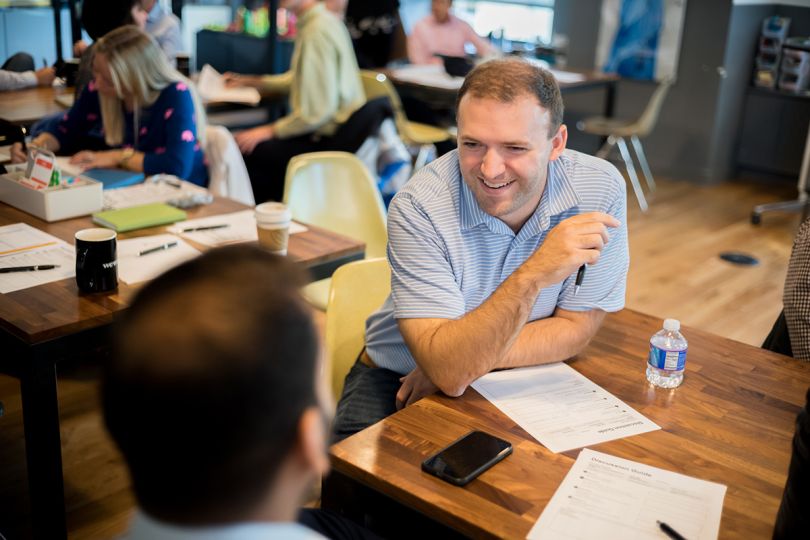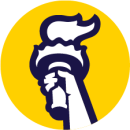If the countless articles and think-pieces haven’t tipped you off that it’s a job seeker’s market, perhaps the frequent Zoom send-offs, new hires on your team and increased referral bonuses have.
According to the New York Times, tech unemployment is currently below 2 percent — a statistic that signifies workers aren’t just chasing new opportunities, but are being courted by companies offering them exciting roles and accelerated career growth. Factors like burnout, the desire for more flexible work arrangements and salary hikes are giving once-satisfied employees a wandering eye. In fact, 62 percent of software engineers describe themselves as “open to exploring new jobs.”
Yet in this competitive race for talent, Liberty Mutual has an ace up its sleeve.
Senior Software Engineer Ali Flagler said that Liberty Mutual isn’t just focused on bringing in new hires. Instead, the insurance giant is committed to fostering a culture that attracts, and importantly, retains engineering talent.
“I’m on an interviewing committee for entry-level technology roles,” Flagler said, “And one of the things that everyone says is, ‘I can’t believe how long people have been at this company, they must really like it.’”
Take Alison Maxwell. The senior technology architect has been with Liberty Mutual for over 12 years and thus far, hasn’t had her head turned by the current tech-hiring frenzy.
“Throughout my time here, I have had opportunity, support and mentorship from many different people across the company,” Maxwell said. “There are so many opportunities for career growth at Liberty Mutual. You’re given the power to make the most of every one.”
Retention statistics can’t be faked during a candidate screening call. When it comes to employee satisfaction, Liberty Mutual has architected a culture where engineers say they’re able to work with cutting-edge tools, are given the resources and support to master those tools, and are celebrated for their impact. For Engineering Manager Gabriel Leake, it’s this constant cycle of learning and recognition that has made Liberty Mutual such a rewarding place to work.
“We want to make sure employees feel valued and appreciated for their contributions,” Leake said. “Recognition is a key part of our day-to-day, and reinforces a sense of belonging and connection in our global employee population, especially while so many of us work remotely.”
Learning new tools and creating real business impact deserves praise: It’s no small feat to deploy new releases at one of the largest insurance companies in the world. But thanks to training programs, company-provided resources and an abundance of managerial support, employees find they have all the support they need to thrive.
“By providing consistent guardrails of support and mentorship, along with additional learning opportunities and resources, you can really embrace the challenges and opportunities that Liberty Mutual gives you,” Flagler said.
Liberty Mutual is in the midst of a substantial modernization effort. Can you tell us about the technology your team is implementing?
Maxwell: Several years ago, Liberty Mutual developed a technology manifesto that outlined where the company was, where it was going and what needed to change as part of our transformational journey. This manifesto laid out the tools needed to compete in the marketplace, and built a picture around the types of technology and skills employees needed in the future. Central to this plan was to build software in an agile way. Since then, we’ve worked to migrate our workloads to the cloud, emphasize great customer experiences and remove friction for internal operations. We’re currently multi-cloud, running our workloads across Amazon Web Services, Microsoft Azure and Google Cloud Platform.
The volume of data we have and the pace of its accumulation will only accelerate. We think the cloud is the best place where data gains scale, agility and power to drive innovation. Our developers are building solutions that can capitalize on our data in real time through artificial intelligence and machine learning. One of our current projects focuses on using machine learning to build out a smart documentation-parsing pipeline that can turn unstructured data into structured data that can be used in downstream automation. That’s just one example of how we’re using cloud technology to capture data and turn it into a usable format.

What’s it like getting to use new technology on a regular basis?
Leake: Technology is always changing, so our teams are rapidly learning and evolving to keep up. As they’re doing that, they’re helping our customers experience better performance, and are getting more features out faster. Our teams love getting that fast feedback from customers, which helps us adopt that tech-forward culture even more.
Because we’ve moved a lot of our on-prem applications into the cloud, it saves a lot of cost from an organizational standpoint, allowing us to hire even more engineers and invest money into other growth initiatives. From an engineering perspective, the experience is so much better. Engineers can move faster, get things out to customers, test and learn quickly — all while driving up our throughput and enhancing our application stability.
Maxwell: Another piece of our modernization has been looking for continuous improvement in our solutions in the cloud. AWS has a well-architected framework, which allows us to build better solutions and optimize cost, resiliency and performance. It’s been fun to work on.
Additionally, we’re always trying to simplify and unify our developer experience when building in the cloud. For example, our internal marketplace gives developers patterns and pipelines so they have a jumpstart on building, and know that their solution will be secure, performant and cost-effective. Then, they can focus on delivering new capabilities.
A tech-forward leadership team
We’ve spoken a lot about the tech your teams are using. How do new hires and those new to the industry get up to speed?
Flagler: We have a program called TechStart, which is a year-long development initiative designed to be an entry point for IT talent into Liberty Mutual. It lays the groundwork for long-term success in the IT field by harnessing the benefits of working for a large company with access to the newest tech. As a cohort-based program, it builds a diverse, equitable and inclusive working environment centered around flexibility, community, growth and development.
Not all IT jobs or roles are hired through the program, but it allows a development path for individuals to grow certain skills that we’re looking for in IT professionals. TechStart encompasses all portions of the tech organization, so it’s not just one track to a specific team. There are roughly 120 TechStarters onboarded annually in full-time or internship tracks. Hires who join Liberty Mutual as TechStart interns before transitioning into full-time employees have higher retention and performance rates, and reach managerial roles faster.

What does the TechStart program look like in practice?
Flagler: Through TechStart, there are ample opportunities to network, build tech skills and work with innovative technologies. It includes three main assignment phases: The first is a foundational assignment, which kicks off the program with an orientation to the company and its business units. Basically, this includes anything the tech team might need to know about what goes on behind the scenes.
This is followed by four weeks of immersive technical training. This portion is constantly changing, because we’re always looking to ensure we’re using the most relevant tools in the industry. It’s a great way for cohort levels to set expectations in a really non-competitive setting.
Following technical training, everyone gets set up with a team assignment before moving on to an individual assignment phase, where participants work alongside an existing agile team to cultivate a robust technical solution that addresses a real challenge — it’s not just some made-up problem. Because everyone is on their own on an active tech team, there’s room to grow as an individual contributor, and you can refine your career interests.
Building a more welcoming tech industry
How do teams share and celebrate what they’re accomplishing?
Leake: We have a tech-focused content series, Tomorrow Talks, that brings together Liberty Mutual’s partners, influencers and subject-matter experts to discuss new perspectives on today’s business challenges and explore how we can build better solutions. The series celebrates the innovative and exciting work we’re doing, as well as the teams driving the company. It really allows us to champion our ambitious culture.
Behind the scenes of Tomorrow Talks
“This series connects me with others in the company who are focused on similar endeavors,” Leake said. “When I participated, I was able to partner with people who I’d never met, and together, we shared what we were working on. Together, we represent the company’s drive to focus on emerging tech.”
“Our company really marries our culture of continuous improvement with tech, which creates an environment of learning and celebration. Efforts like Tomorrow Talks show people that we value what they’re doing.”




